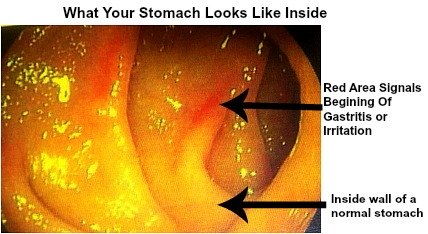Alcoholic Gastritis
Causes, Symptoms, Diagnosis, Treatment
& Prevention Of Alcohol-Induced Gastritis

Alcohol-induced gastritis is a condition that affects millions of people
every day, and the amount of alcohol one must consume in order to experience
alcohol gastritis does not have to be much. Your reaction to alcohol depends on
your own level of tolerance. Alcohol gastritis can be present in people who
only have the occasional glass of wine at weddings as well as in chronic
alcoholics.
What Is Alcohol-Induced Gastritis
Alcohol-induced gastritis is the inflammation or irritation of the inside wall of the stomach by alcohol. This causes redness and "peeling away" of the lining of the wall of the stomach.
Alcoholic gastritis can lead to severe stomach pain, and in extreme cases, bleeding from the stomach. Usually, it does not cause serious, long-term problems or permanent damage to the stomach. However, if continuous drinking causes a person to experience repeated instances of alcoholic gastritis, it can lead to the development of stomach ulcers and even stomach cancer.
The culprit is not necessarily the consumption of alcohol.
Science can support the fundamental benefits of drinking red wine for its
antioxidant benefits and for its important bactericidal impact on H. pylori, which can cause infection. It is clear that moderate
consumption of wine and other alcoholic beverages can help destroy bad bacteria in our stomachs and
preserve stomach health.
Symptoms of Alcoholic Gastritis
The symptoms of alcohol gastritis, or alcoholic gastritis, are generally those of any other type of gastritis. They include:
Though the quantity of alcohol may not matter
much for alcohol gastritis or alcohol-induced gastritis to happen, you are more
likely to suffer with this condition if you binge drink or drink very strong
concentrations of alcohol in your drinks.
Diagnosis Of Alcohol-Induced Gastritis
Diagnosing alcohol-induced gastritis can be as simple as your doctor listening to your history and your symptoms. Developing a stomachache after consuming alcohol, along with any of the above symptoms is a key indicator that any discomfort, pain, or irritation of the stomach lining is likely due the alcohol in your system.
If you have very severe symptoms however, your doctor may want to administer one of the following tests to confirm a diagnosis, and to exclude other potentially-serious problems that could cause stomachaches after a night out drinking, or drinking too much in general.
Blood Tests
Common blood tests done in the work-up of symptoms of alcoholic gastritis include FBC (Full Blood Count - also called complete blood count or CBC), to show if your white blood cells are elevated, and to exclude anaemia or significant blood loss as possible culprits.
U&E (Urea and Electrolyte -also called Blood Urea Nitrogen or BUN) assess how your kidneys are working to balance the salt and water in your body.
Amylase to determine if the abdominal pain can be attributed to pancreatitis instead of gastritis. Other blood tests that might be done may include a liver function test (LFT), Cryo-reactive protein (CRP), and coagulation profile.
Endoscopy (Esophageal-Gastro-Duodenoscopy - OGD)
An endoscopy of the stomach allows for a flexible, small tube with a camera at the end to be passed down to your stomach to detect irritation, injury, or internal bleeding.
Stool Test
A stool test is another method for verifying
gastritis is the cause of the stomach pain. A stool test will help doctors
detect the presence of Helicobacter pylori, a bacteria that usually indicates
the presence of infection.
Treatment of Alcoholic Gastritis
Alcoholic gastritis can be treated easily by reduction in, or elimination of, alcohol consumption. Over-the-counter medications can be used to remedy stomach pain. Patients should be careful to avoid aspirin-based medicines, or any medicines containing ibuprofen or diclofenac. Instead, opt for paracetamol or acetaminophen.
Use medicines like Lansoprazole (Prevacid) or
Omeprazole (Prilosec) to help heal the lining of the wall of the stomach. Lansoprazole
is often given as a 30mg tablet or capsule to be taken once daily for up to 14 to
28 days. Other medicines that could be added to the
treatment include Gaviscon or Aluminum hydroxide (Amphojel, AlternaGEL).
References:
- Luis Bujanda MD, PhD. The effects of alcohol consumption upon the gastrointestinal tract. The American Journal of Gastroenterology (2000) 95, 3374–3382; doi:10.1111/j.1572-0241.2000.03347.x
Gastritis. Have Your Say!
Do you have upper abdominal pain after alcohol consumption? Have you been told that you may be having gastritis? Or are you looking for help with this problem? Share your thoughts here. We would certainly love to hear from you!
|
Help Keep This Site Going |




